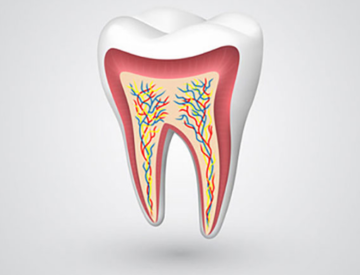
It’s a common occurrence for many people—that shot of pain when you bite into your ice cream or take a gulp of cold water. The inevitable wincing that follows these occasions is well justified since having sensitive teeth is uncomfortable and painful!
Wondering what’s the root cause of your tooth sensitivity? (And yes, you’re welcome for the pun!)

3 Layers of Teeth
It is helpful to begin thinking about your sensitive teeth in their three basic layers:
First, there is the enamel. This is the hard outer layer of your tooth – the part you see every day. It acts as a protective shell for your tooth and keeps the inner layers protected.
Below the enamel, you have a layer of dentin. This is a relatively hard layer that encases the third layer and has channels running to your nerves.
The third layer is your tooth’s pulp, which houses the nerves – those pesky (but necessary!) alarm bells that go off when that blessed ice cream hits your tooth!
Sensitivity problems occur when your dentin is no longer protected by your enamel, and the cold is carried through the dentin layer to your nerves via tiny channels called tubules.
What causes the dentin to become exposed?
Your dentin can become exposed when:
- The Enamel is Eroded: Enamel erosion happens when acidic beverages and foods are a high part of your diet. They wear through the enamel over time, and unfortunately, once the enamel is eroded, it cannot be restored.
- Your Gums are Receding: Gum recession can expose dentin and stimulate the nerves with cold and hot foods and beverages.
- You’re Brushing too Hard: Brushing your teeth aggressively with a hard bristled brush can damage your gum tissue and cause root exposure.
- You’re Grinding Your Teeth: Grinding your teeth while you sleep can cause enamel erosion as well!
What You Can Do to Help Sensitivity?
Get an Assessment
If you are experiencing tooth sensitivity for the first time, it’s best to book an appointment with your dentist. An x-ray and examination will help assess your overall oral health to ensure that your pain is not caused by a cavity or other decay for which you should seek treatment.
Sensitivity Toothpaste
There are many over-the-counter sensitivity kinds of toothpaste that can help diminish your tooth sensitivity by protecting your tooth and helping to seal the tubules leading to your nerves.
Toothbrush Choice
You may also consider using a soft-bristled toothbrush and avoid aggressive brushing, especially along your gum lines. This will help avoid gum recession and root exposure, thus helping to eliminate sensitivity.
Night Guard
Invest in a night guard if you grind your teeth at night, as this will protect your teeth and help prevent enamel erosion!
Over-the-counter Toothpastes Not Helping?
Let your dentist know, and they may be able to prescribe stronger toothpaste or provide other sealing options to help reduce the sensitivity.
Our team at the Dental Care Centre can help you with any tooth sensitivity you may be experiencing! Reach out and book an appointment with our dentists in Grande Prairie today!
